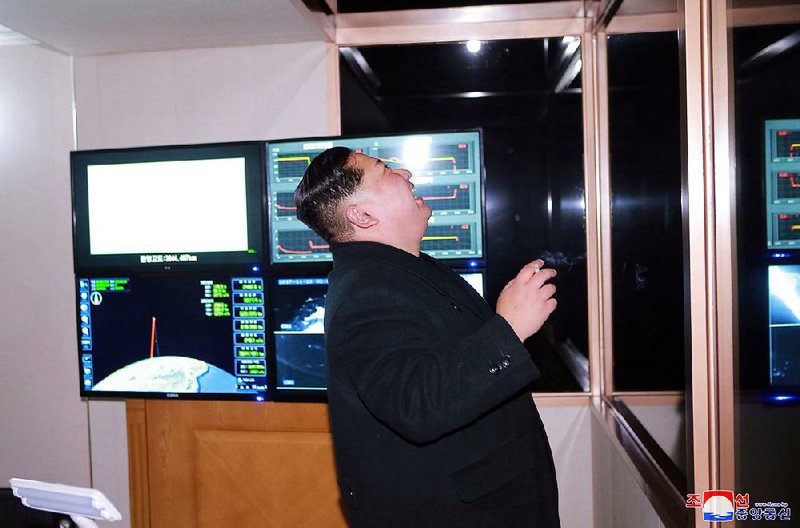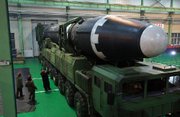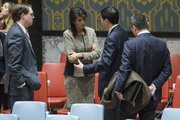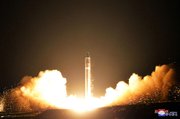WASHINGTON -- U.S. Ambassador Nikki Haley said Wednesday that North Korea's launch of an intercontinental ballistic missile that some observers believe could reach Washington and the U.S. Eastern Seaboard "brings us closer" to a war the U.S. doesn't seek.
Haley, speaking at an emergency meeting of the U.N. Security Council, said that if war comes as a result of further acts of "aggression," then "make no mistake, the North Korean regime will be utterly destroyed."
"The dictator of North Korea made a decision yesterday that brings us closer to war, not farther from it," Haley said. "We have never sought war with North Korea, and still today we do not seek it."
President Donald Trump's administration threatened new sanctions on North Korea after the reclusive government shattered 2½ months of relative quiet with its most powerful missile test yet.
[PRESIDENT TRUMP: Timeline, appointments, executive orders + guide to actions in first 200 days]
Trump tweeted that he spoke with Chinese President Xi Jinping about Pyongyang's "provocative actions" and vowed that "additional major sanctions will be imposed on North Korea today. This situation will be handled!"
Trump's top diplomat, Secretary of State Rex Tillerson, said the U.S. could target financial institutions doing business with the North. And State Department spokesman Heather Nauert said the interdiction of ships on the high seas "could be a major new pressure point" against North Korea.
Heightened inspections of sanctioned ships was part of a draft resolution circulated among Security Council nations earlier this year, but the provision was ultimately dropped.
The U.S.' goal "is to persuade the regime it needs to reconsider the path it is currently on and think about engaging in a meaningful dialogue about a different future," Nauert said.
Tillerson said the Treasury Department would announce any new sanctions.
At the emergency Security Council meeting, China's deputy United Nations ambassador, Wu Haitao, reiterated the China-Russia proposal for North Korea to suspend all nuclear and missile tests and for the U.S. and South Korea to suspend all military exercises.
Russian U.N. Ambassador Vassily Nebenzia also urged North Korea to stop the tests and called on the U.S. and South Korea to cancel large-scale military maneuvers scheduled for December.
The fresh deliberations about new forms of punishment for North Korea came after its government said it successfully fired a "significantly more" powerful, nuclear-capable ICBM it called the Hwasong-15. Outside governments and analysts concurred that the North had made a jump in missile capability.
A resumption of Pyongyang's torrid testing pace in pursuit of a viable arsenal of nuclear-tipped missiles that can hit the U.S. mainland had been widely expected. But the power of the missile and suddenness of the test jolted the Korean Peninsula and Washington. The launch at 3:17 a.m. Wednesday local time -- early Tuesday afternoon in the U.S. capital -- indicated an effort to perfect the element of surprise and obtain maximum attention in the U.S.
In a government statement released through state media, North Korea said the Hwasong-15, the "greatest ICBM," could be armed with a "super-large heavy nuclear warhead" and is capable of striking the "whole mainland" of the U.S. The North said the missile reached a height of 2,780 miles and traveled 590 miles before accurately hitting a sea target, similar to the flight data announced by South Korea's military.
After the launch, it said leader Kim Jong Un "declared with pride" that his country had achieved its goal of becoming a "rocket power." State TV said Kim gave the order Tuesday, and it broadcast a photo of the signed order where he wrote: "Test launch is approved. Taking place at the daybreak of Nov. 29! Fire with courage for the party and country!"
Speaking Wednesday, Trump took a dig at Kim. Digressing during a speech in Missouri on taxes, Trump called Kim "Little Rocket Man" and described him as "a sick puppy."
A rattled Seoul responded to the launch by almost immediately launching three of its own missiles in a show of force. South Korean President Moon Jae-in expressed worry that North Korea's missile threat could force the U.S. to attack the North before it masters a nuclear-tipped long-range missile.
The launch came a week after the Trump administration restored North Korea to a U.S. list of terror sponsors. The test was North Korea's first since Sept. 15 and may have broken any efforts at diplomacy, as U.S. officials had sporadically floated the idea of direct talks with North Korea if it maintained restraint.
The missile also appeared to be an improvement on North Korea's past launches.
If flown on a standard trajectory, instead of Wednesday's lofted angle, the missile would have a range of more than 8,100 miles, said U.S. scientist David Wright, a physicist who closely tracks North Korea's missile and nuclear programs.
"Such a missile would have more than enough range to reach Washington, D.C., and in fact any part of the continental United States," Wright wrote in a blog post for the Union for Concerned Scientists.
Japanese Defense Minister Itsunori Onodera said the missile landed inside Japan's special economic zone in the Sea of Japan.
A big unknown, however, is the missile's payload. If, as expected, it carried a light mock warhead, then its effective range would have been shorter, analysts said.
In his call with Xi, Trump made clear "the determination of the United States to defend ourselves and our allies," according to a White House statement. Trump also "emphasized the need for China to use all available levers to convince North Korea to end its provocations and return to the path of denuclearization."
The Trump administration bolstered U.S. sanctions against North Korea last week and imposed new restrictions on North Korean shippers and Chinese companies that deal with the North.
China's state-run Xinhua news agency said Xi told Trump that China remained determined to clear the Korean Peninsula of nuclear weapons and to preserve peace and stability in Northeast Asia.
CRISIS PLANNING
Also Wednesday, U.S. and Chinese generals engaged in low-profile and unpublicized security talks focused on how the American and Chinese militaries might communicate in a crisis, though the Pentagon stressed that the talks were scheduled long before North Korea's surprise missile launch.
The meeting at the National Defense University in Washington took place as signs surfaced that China is more willing to discuss how the two world powers would manage an even worse emergency on the divided Korean Peninsula.
U.S. officials insisted the dialogue wasn't centered on North Korea or anything else in particular.
"The engagement will serve as an opportunity to discuss how to manage crises, prevent miscalculations, and reduce the risk of misunderstanding," the office of Gen. Joseph Dunford, chairman of the Joint Chiefs of Staff, said in a statement ahead of the meeting.
The U.S. and China agreed on the talks when Dunford met with his Chinese counterpart in Beijing in August. While in China, Dunford observed a Chinese military drill at Shenyang, about 120 miles from the North Korean border.
Wednesday's talks were led by Lt. Gen. Richard Clarke, the Joint Chiefs' planning director, and Maj. Gen. Shao Yuanming, a senior Chinese military official. They're noteworthy given the long-held strategic mistrust between the U.S. and China and Beijing's increasing challenge to Washington's post-World War II dominance in the Asia-Pacific.
China has been more explicit in describing the talks.
Yao Yunzhu, a retired general who specializes in U.S.-Chinese defense relations at China's Academy of Military Science, said this summer that the talks would pertain to issues in northeast Asia, where North Korea is located. She also mentioned the Taiwan Strait and the South China Sea.
Yun Sun, an expert on Chinese foreign policy at the Stimson Center think tank, said Dunford raised North Korean contingencies at the August meeting and that the two sides discussed the potential danger of a conflict or a nuclear disaster. U.S. officials wouldn't confirm that account. Sun said she anticipated those talks would continue during the discussions this week.
While such discussions have occurred in recent years among nongovernment experts, they hadn't yet happened at official levels.
Oriana Skylar Mastro, a Georgetown University professor, said her Chinese contacts indicated willingness to broach North Korea contingencies in the military dialogue.
"Things are shifting right now in both China and the United States. There seems to be an opening," Mastro said. She expected the talks would still be at a preliminary stage.
Information for this article was contributed by Matthew Pennington, Kim Tong-Hyung, Lolita C. Baldor, Robert Burns, Foster Klug, Mari Yamaguchi and Edith M. Lederer of The Associated Press; and by David Tweed, Nick Wadhams, Isabel Reynolds, Ting Shi, Peter Martin and Kanga Kong of Bloomberg News.
A Section on 11/30/2017




